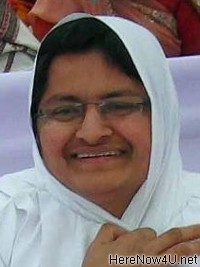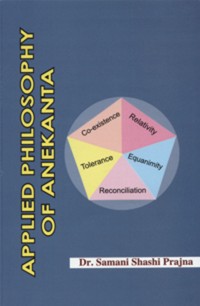Anekānta is a well known principle of life. This principle begins with a change in vision. When our vision is not holistic, then our thoughts are not distilled about both the gross and the subtle world. Mahāprajña quite often used to quote an incident of a dogmatic person. He tries to quench his thirst, by drinking the dirty water of his father's pond, while clean water is available to him. This kind of dogmatic view is found where the third eye, which sees the truth is not open. Dogmatism is the result of the lack of understanding.[1] Many scholars limit the use of anekānta at the level of gross world, this way they narrow down the scope of anekānta. There is a saying that 'Beauty lies in the eyes of the beholder.’ This means that a person sees what he wants to see. The concept of anekānta lays emphasis on an individual thought process thought process to accept the truth present in the views of others too and accommodate them. This virtue of acceptance is very essential for a society as a whole.It will help in putting a halt to the ever increasing incidents of violence. Recently anti-christian riots occurred in Orissa, violence against North Indians in Mumbai, Taj Hotel bomb blast,series of bomb blasts in different cities of the country etc. are live examples of a one sided perspective.
Every individual should adopt the following maxim i.e. "Do unto others what you want others to do unto you." If this subtle kind of vision develops with in human consciousness, then I think all the problems deriving from the absence of compassion namely dowry deaths, feticides and cosmetic tests on animals and over exploitation of natural resources for the personal end, all these problems can be resolved.
It is this human mind, which is responsible for anekāntic thought. It is the power of mind to think both creatively and destructively. John Milton rightly said, ‘It is man’s mind, which can make hell of heaven and heaven of hell.’ The U.N. Charter rightly commented that 'War is first of all fought in the minds of men before it is actually fought on the battlefield.” It is the mind which makes plans, build strategies, set goals and breeds love or hatred towards others and which determines one’s healthy or poor relationships.
The happy outcome of anekānta is the birth of an individual with an attitude of non-insistence or refraining from insistence.A person having one-sided perspective always gives insistence to his own views and it results into quarrel. The supreme way out of such quarrel is the application of anekāntic perspective.[2] Such person with the above attitude analyses an event from multiple angles as a result of which, he develops a view-point of reconciling different parts and aspects of the truth. 'Only what I believe is truth and what others believe in, is false.'[3] If one does not give up this, he will be doing injustice to other and this too amounts to violence. It is, therefore an absolute necessity for a non-violent to be a non-extremist. It serves as the key to unlock the doors of wisdom and a successful means to establish uniformity amidst diversity in views. Unless we are prepared to change our vision, we can't balance our behavior. The discretion of where to remain active, where to be inactive and where to ignore should be very well understood. We should leave bad habits, develop good ones and thereby remain in the state of balance or equanimity. To ignore evil means to be in the state of balance. Our own peace of mind comes first, only after that we can think of a peaceful family and peaceful society as a whole.
 Dr. Samani Shashi Pragya
Dr. Samani Shashi Pragya

